THE AMERICAN DYNAMITERS. T HE recent revelations of the terrorism practised
in the United States in support of trade unionism—really, of course, greatly to the detriment of trade unionism—will cer- tainly become a legend as horribly alluring in its way se the story of the "bad men" of America, such as the noto- rious Billy the Rid and the desperadoes of the Lincoln County War, or of the Kelly bushranging gang in Australia, We know already that the brothers McNamara, who pleaded guilty to the series of unparalleled crimes—unparalleled for motive—were sentenced to long terms of penal servitude, and that the case against them as it was presented in Court had been worked up by a detective named W. J. Burns. In the January number of the World's Work there is a report of an interview with Mr. Burns in which be describes how he discovered the dynamiters and arrested them. It is a singular narrative.
One likes to think of a famous detective in real life or fiction as having a very distinguishing character of his own—
the enduring criminal slyness of the reformed Yidocq, the
kindliness of Bucket, or the deductive logic of Sherlock Holmes. The writer in the World's Work gives us to under-
stand that Mr. Burns is less like a detective than any detective who ever lived. But what is a detective like? We confess that we do not know, and we should have a poor opinion of detectives if we did. But this is by the way. Mr. Burns's personal appearance, we are told, is a "perfect disguise" in itself, and " the outward habit of his mind is as good as an alias." He is " red " and " brisk," and rather small, and has the appearance of " a prosperous business man." So far as we can gather, when he is "cleaning up "the evidence against any one be lives in the glare of publicity. He appears to enjoy himself at his hotel, and when he walks abroad he is followed by a small army of reporters to see what be does. Apparently all this is a mask, behind which the real detective (the other per- sonality of the outward habit that is as good as an alias) works. It is an attractive notion this of the detective pur- suing secrecy in publicity, radiating the appearance of candour, and jovially allowing his footsteps to be dogged by the more conventional amateur detectives of the Press, not to mention the rival detectives " for the defence."
Mr. Burns was called in to investigate a dynamite outrage on September 4th, 1910, when two explosions, doing much damage to the property of contractors, took place at Peoria, Illinois. A month later this was followed by the famous outrage at Los Angeles, when part of the office of the Los Angeles Times was blown up and many persons were killed. Mr. Burns worked backwards and discovered a connexion between these crimes and others which had extended over a number of years, all of them directed to terrifying em- ployers into excluding non-unionists from their works. The dynamiters were the missionaries of "the closed shop "- works closed to all but trade-union labour. The outrages began in 1905. In 1906 the first clockwork bomb was found after an explosion at Cleveland. In 1908 there were twenty dynamite explosions and four attempts; in 1909 and 1910 thirty-five explosions and three attempts. In spite of the loss of life it seemed that it was not the intention of the Anarchists to take life but rather to destroy property. During the years before Mr. Burns was called in a good deal of detective work had been done. One detective agency, he says, " had drawn £8,000 without turning up a dynamiter." Mr. Burns's opinion of private detectives as a class is not favourable. He calls them "the worst lot of blackmailing scoundrels that live outside of prisons."
After the Peoria explosion in 1910, which, as we have said; was the occasion for employing Mr. Burns for the first time, another clockwork bomb was found. " It had been made as prettily as a toy," says Mr. Burns. " It was all new and bright. You could imagine the man who made it holding it off on the palm of his hand and putting his head on one side and being proud of it." A nitro-glycerine can was also found, but the name stamped on it was the name of the maker of the can, not of the maker of the nitro-glycerine. It seems that there is no standard can in the nitro-glycerine trade. Each manufacturer uses his own, and as a rule the cans do not travel far owing to the danger of handling them. Railways refuse to carry them. A description of the can found at Peoria was published in the newspapers, and a man at Portland, Indiana, two hundred miles away, wrote to say that it was probably one of his. When the man from Portland came to Peoria he recognized the can at once, and said that he bad sold it to a man calling himself J. W. McGraw. McGraw had bought a hundred quarts of nitro- glycerine in August, saying that they were to be used in a quarry belonging to G. W. Clark at Indianapolis. On the day, however, when he received delivery of them on the high road he said he was going to take them to Muncie and thence by motor car to Peoria. Why any man wishing to avoid suspicion should let out the real name of the place he was going to would be completely mystifying were it not that one remembers that throughout the history of crime the criminal has been detected by some elementary blunder or astonishingly
fatuous lapse in covering up his tracks. Such lapses appear in plans of astounding ingenuity. At Muncie Mr. Burns found, sure enough, the name of J. W. McGraw registered at an hotel, and at the end of three weeks' search he had good descriptions of McGraw and a specimen of his handwriting besides the clockwork bomb. It was now-clear that the dyna- miters ranged over a large tract of country and had plenty of money at their disposal. It seemed probable, for the first time, that all the explosions had been the work of a single gang.
As McGraw had blurted out the truth about going to Peoria it seemed that there might also be some truth in his story about the quarry of G. W. Clark at Indianapolis. At Indiana- polis there was no such person as G. W. Clark, but Mr. Burns's searchers came across the tracks of a man who was unques- tionably J. W. McGraw. They also discovered that the principal acquaintance of this man was one John J. McNamara, Secretary and Treasurer of the International Association of Bridge and Structural Ironworkers. Now, Mr. Burns had already happened to have heard of John J. McNamara as having warned employers that all non-union men must be dis- missed from a job in Peoria. By the end of September he had a considerable staff at work watching John J. McNamara.
On October 1st the Los Angeles outrages took place—the tragic explosion at the office of the Times and the attempt at the house of General Otis, the owner of the paper, who was a notorious opponent of the trade-union policy of the closed shop. The bomb at General Otis's was found by the gardener, and began whirring when the detectives tried to cut open
the suit case which contained it. They fled just in time and the bomb only blew a hole in the ground. But the most important discovery of all was yet another bomb, undischarged, which was an exact duplicate of the one found at Peoria.
At this point Mr. Burns was called in by the Mayor to take over the investigation of the Los Angeles crimes. He no longer had the least doubt, as to the connexion between the various crimes or as to their unity of motive. The material of the undischarged bomb—eighty per cent. gelatine, an un- usually powerful explosive—was traced by him to a firm in San Francisco, which said that the material had been sold to a man called J. B. Bryce. Bryce could not be found, and when Mr. Burns had tried in vain for some time to discover his whereabouts the Mayor of Los Angeles decided to spend no more money on Mr. Burns and cut off the fund for expenses. The Los Angeles authorities might have continued to pay if Mr. Burns had supplied a daily report of his labours, but he could not have done that without the risk of all his informa- tion leaking out. He knew that he was on a very hot scent indeed, and he decided to pay his own expenses. It cost him £2,800 before he had finished. Meanwhile he cast back to Indianapolis and soon came across " McGraw," who turned out to be a man whose real name was MeManigle.
McManigle was watched incessantly, and one day he left Indianapolis and met a man who exactly answered the de- scriptions of J. B. Bryce. "Bryce" turned out to be Jim McNamara, brother of John McNamara, the Treasurer- Secretary of the Ironworkers' Union. For months Jim McNamara and McManigle were watched. Mr. Burns says :—
" Our men oven followed them on a hunting trip and `roped' them, as we say—made friends with them, and camped and hunted with them. Wo got a wholesome respect for Ortio MoManigle's and Jim McNamara's ability with a gun, too. They could stand off at a good distance and roll a tomato can along the ground with revolver shots. MeManigle has told us since that they never saw a sign of any one shadowing them. And they wore always `testing' themselves. They would turn a corner and then hide, and watch to see if any one was following. They would go long distances on unfrequented streets, watching behind them. They would jump on a street car and ride awhile, and got off again and go in another direction in another ear, and watch all the time to see if any one got on or off after them. They did that sort of thing on the night they dynamited the Iroquois Iron Company's plant in Chicago. They both had parcels in their hands, and we could guess that these were bundles of dynamite by the respect they had for them. But they dodged and doubled about so much that our men had to drop them. Our men had orders to drop them always rather than betray themselves. We were determined to find out to whom they were responsible—from whom they were getting money and orders for their work—and it would have boon fatal to lot them suspect that they wore being watched."
At last, in April 1911, Mr. Burns got authority to arrest his
quarry. The arrest was effected in an hotel at Detroit :—
" The lobby was crowded with a theatrical troupe, and McNamara
elbowed his way through towards the door, with McManigle following. McManigle was in handcuffs before McNamara missed him. We grabbed McNamara at the door. As it happened, they had left their revolvers in the satchels—along with a rifle that was fitted with a Maxim ' silencer' for picking off night watch- men, six clock-batteries of the Loa Angeles and Peoria pattern slightly improved, caps, wires, tools, and oven a battery-teeter.
• Well, what the hell's the matter ? ' McNamara, kept demanding. 'What's this for ? "
Jim McNamara offered bribes for his release up to £6,000, and when this was in vain he turned to defiance and said, "1'd blow the whole damn country up if I thought it would get us our rights."
When MeManigle found how much Mr. Burns knew he confessed everything. "There was no 'third degree' [the examination of prisoners by reiteration, which almost amounts to extorting confessions by torture] used," says Mr. Burns.
"I have never used it in my life." Mr. Burns's chief concern, now that he had Jim McNamara and McManigle in custody, was to keep the fact from John McNamara, and thus prevent him from taking fright and disappearing before the papers authorizing his arrest were issued. By a ruse John McNamara was kept in ignorance of the fate of his brother and comrade, and he was duly arrested at the office of the Ironworkers' Union at Indianapolis. At a farmhouse outside the city, which had been mentioned by McManigle, Mr. Burns dis- covered forty pounds of dynamite and some nitro-glycerine. Next he found in a vault under the office of the Union eighty pounds of dynamite and fourteen clocks like those which had been used for timing the explosions of the bombs. At Tiffin, Ohio, he found a cache of 540 pounds of dynamite in a place mentioned by McManigle.
The last stage of this extraordinary history was that Mr. Burns was himself arrested for "kidnapping"" John McNamara. But that was a mistake, and Mr. Burns no doubt felt that he could afford to enjoy it.




















































 Previous page
Previous page